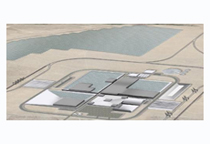Tesla Zooming Ahead With Massive Battery Factory
 Electric car maker Tesla is racing toward building the world’s largest factory for lithium ion batteries. In the company’s earnings call on May 7, Tesla Chief Executive Officer Elon Musk said that Tesla plans to break ground on the factory in a still undetermined location as early as June.
Electric car maker Tesla is racing toward building the world’s largest factory for lithium ion batteries. In the company’s earnings call on May 7, Tesla Chief Executive Officer Elon Musk said that Tesla plans to break ground on the factory in a still undetermined location as early as June.
In an unusual style, Tesla actually plans to break ground on at least two sites (maybe even three) in parallel until it ultimately chooses one. The list has been narrowed down to a handful of states in the southwest including Nevada, Arizona, New Mexico, and Texas (that list also now includes California). Musk said Tesla would break ground on the second site a couple months after the first one.
Why such a big rush? Tesla needs the battery factory to be able to produce enough batteries for 500,000 electric cars by 2020, including for Tesla’s third-generation lower-cost electric car. If the factory isn’t ramped up at the same time as the ramp up of its third-gen car, it would be a big problem for Tesla.
Production of Tesla’s cars is already constrained by battery supply. Tesla buys small-format lithium-ion batteries from Panasonic, and thousands of batteries are used in each Model S battery pack. On the earnings call in early-May, Musk said that battery supply would constrain Model S production in the second quarter of this year, but would be relieved in the third quarter of this year.
 Worries about how battery constraints would hurt the development of the third-gen car are why Tesla is racing forward with the factory so fast and breaking ground on multiple locations. It’s a delicate dance of product launch and supply.
Worries about how battery constraints would hurt the development of the third-gen car are why Tesla is racing forward with the factory so fast and breaking ground on multiple locations. It’s a delicate dance of product launch and supply.
Tesla’s Chief Technology Officer J.B. Straubel said on the earnings call that every one-month delay in the third-gen car due to battery supply constraints "is far more expensive for us than the incremental costs that we may incur up front to kick off two sites at one time."
Musk said, "If we don’t have the Gigafactory online when we have the vehicle capacity online, we will actually be in deep trouble, because we’ll have all the equipment and tooling and people for making cars, but not be able to produce the battery packs."
 Electric car maker Tesla is racing toward building the world’s largest factory for lithium ion batteries. In the company’s earnings call on May 7, Tesla Chief Executive Officer Elon Musk said that Tesla plans to break ground on the factory in a still undetermined location as early as June.
Electric car maker Tesla is racing toward building the world’s largest factory for lithium ion batteries. In the company’s earnings call on May 7, Tesla Chief Executive Officer Elon Musk said that Tesla plans to break ground on the factory in a still undetermined location as early as June. Worries about how battery constraints would hurt the development of the third-gen car are why Tesla is racing forward with the factory so fast and breaking ground on multiple locations. It’s a delicate dance of product launch and supply.
Worries about how battery constraints would hurt the development of the third-gen car are why Tesla is racing forward with the factory so fast and breaking ground on multiple locations. It’s a delicate dance of product launch and supply.